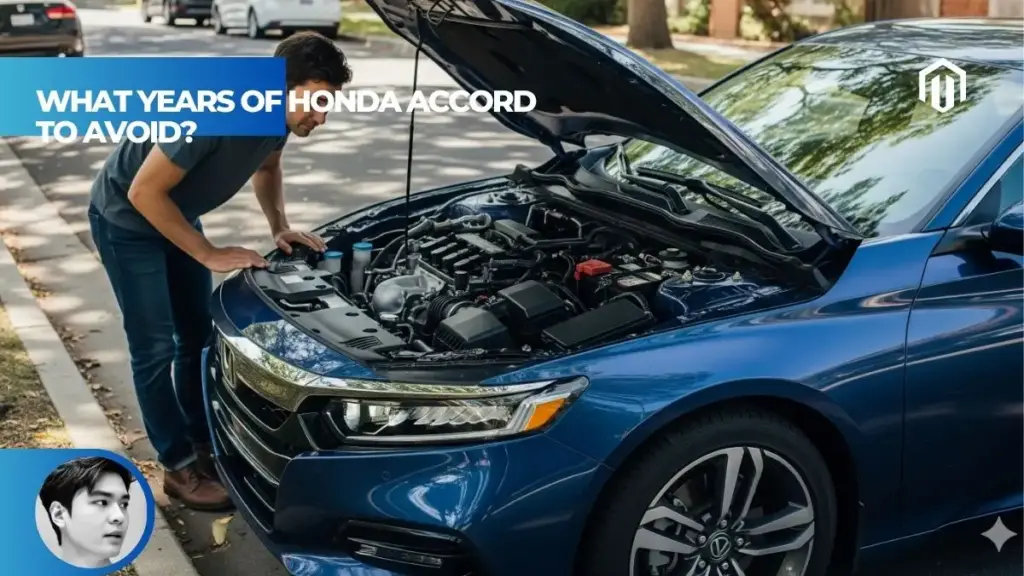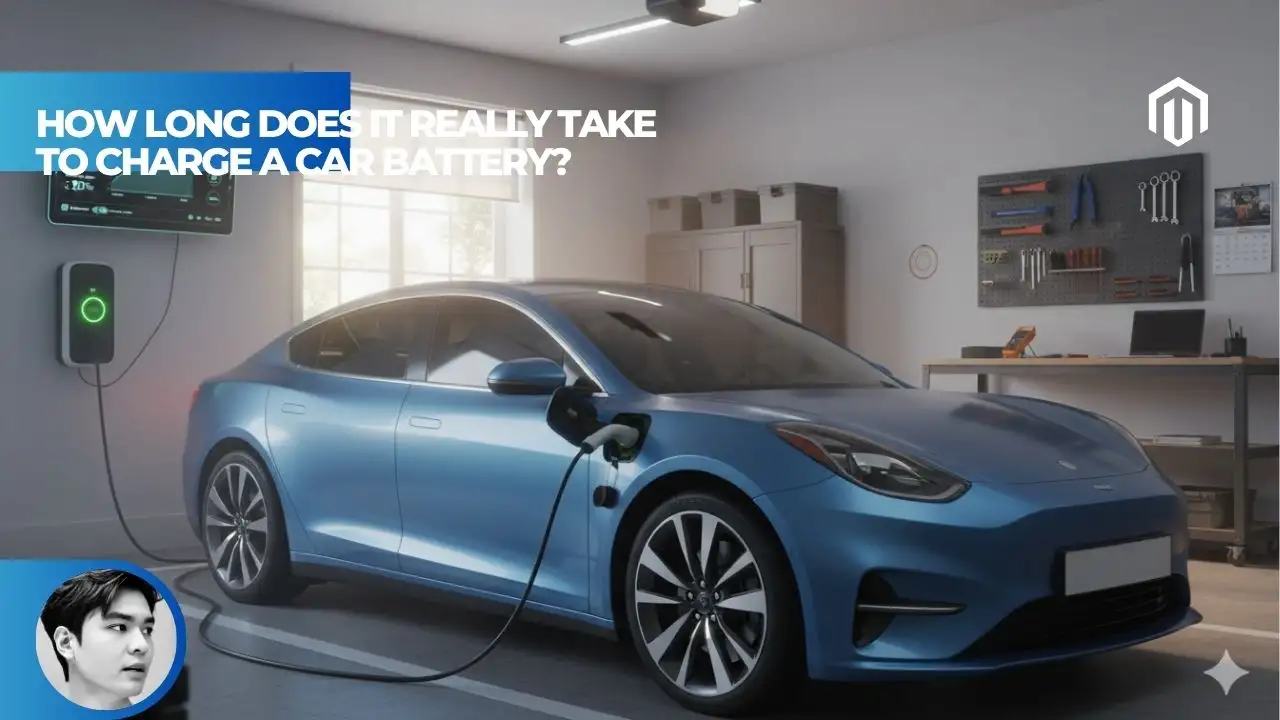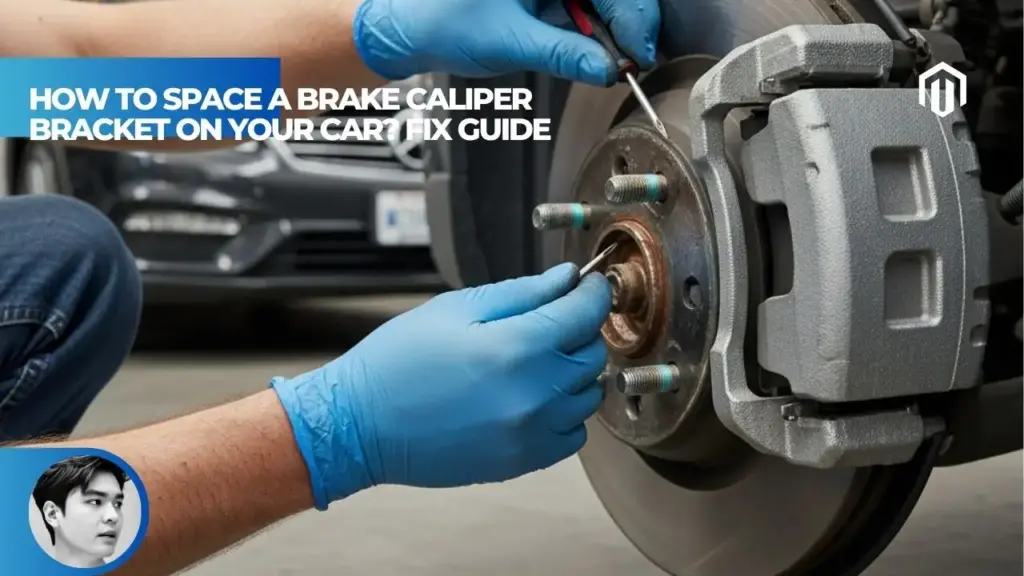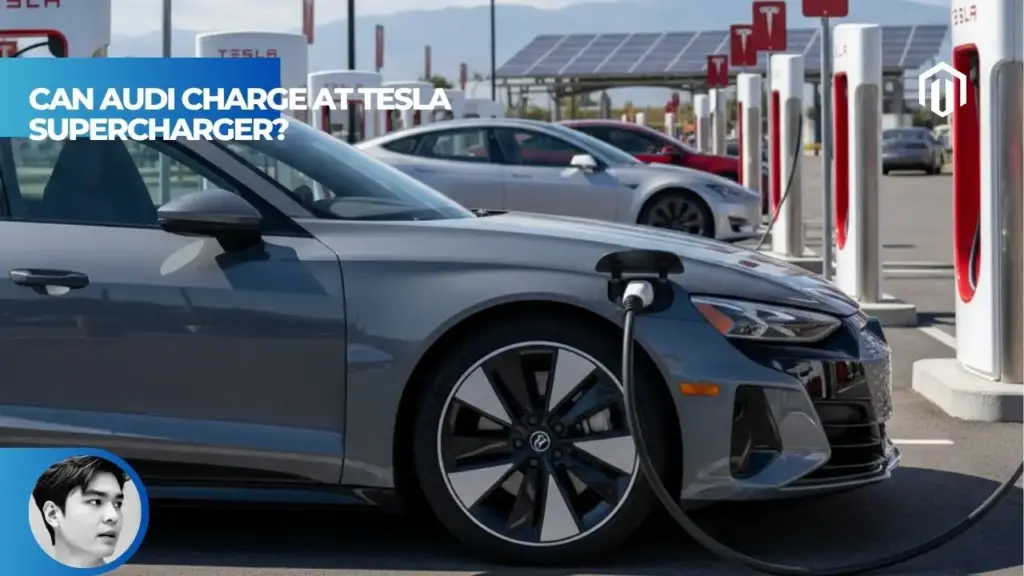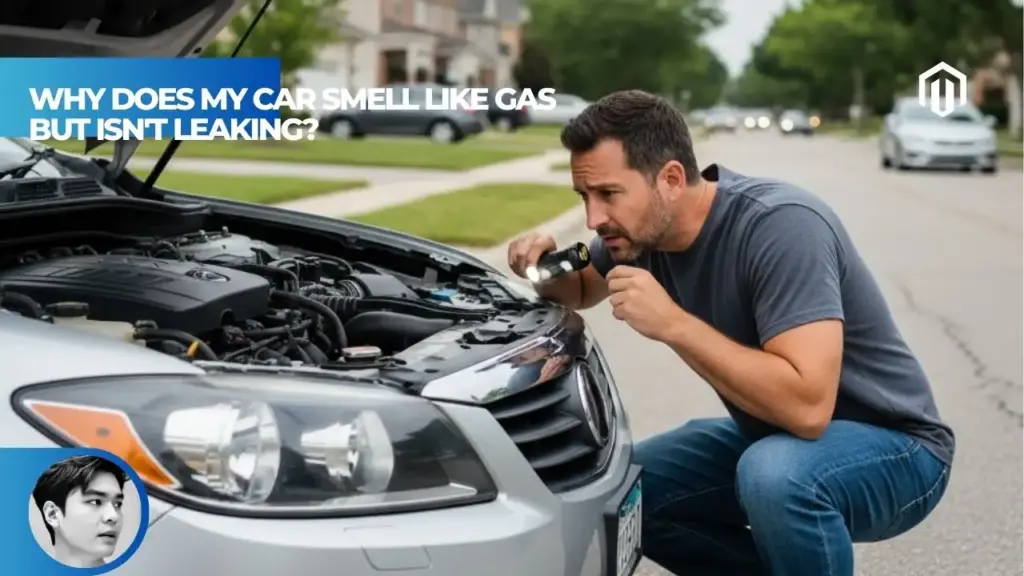You may also like:
The 2003-2004 Honda Accord with automatic transmissions suffer from catastrophic failures costing $2,700+ to repair, while 2008 models have excessive oil consumption issues requiring quart additions every 1,000 miles, and 2018 models experience oil dilution problems with their 1.5T engines. The safest years to buy are 2016-2017 (refined 9th generation), 2011-2012 (improved 8th generation), and 2021-2022 (modern features with proven reliability).
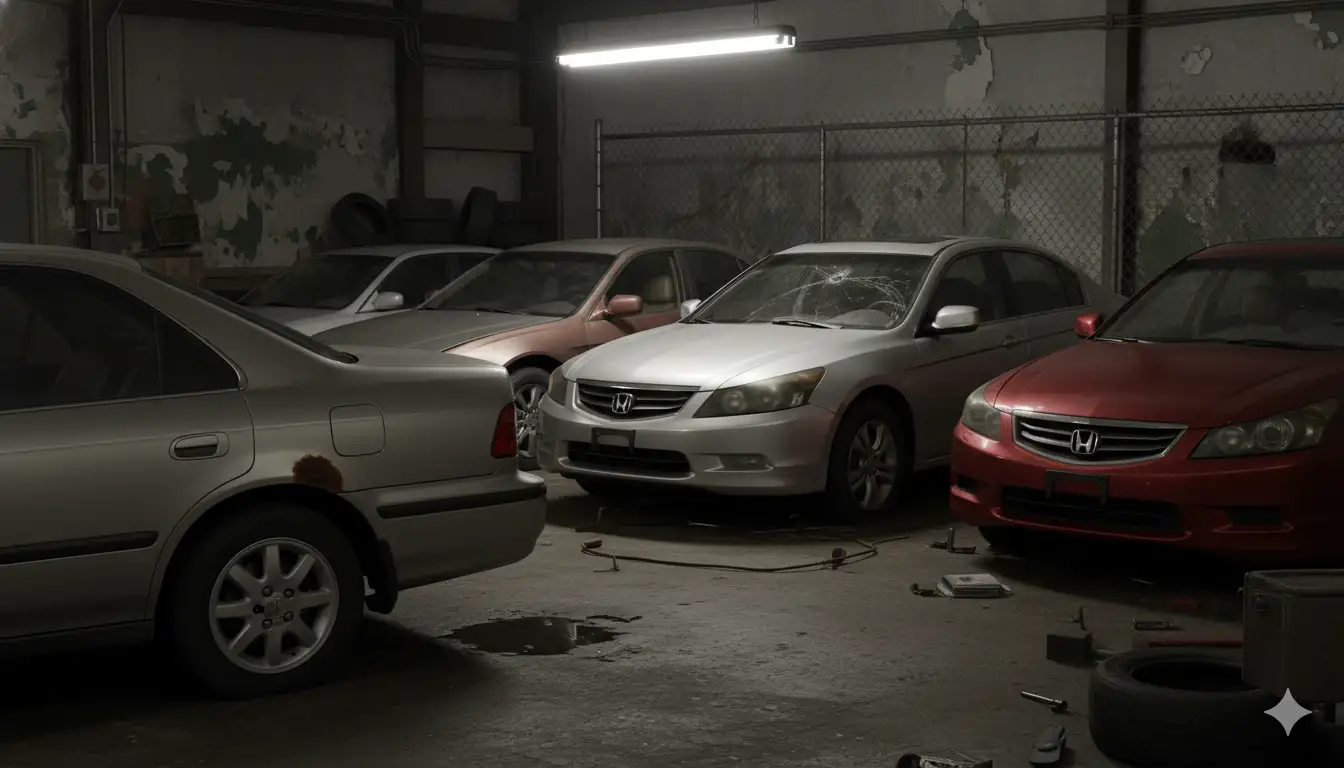
Honda Accord Years to Avoid – The Critical Problem Years
While Honda Accords have earned a reputation for reliability over decades, certain model years present expensive problems that used car buyers should carefully avoid. Understanding these problematic years can save thousands in unexpected repair costs.
2003-2004 Honda Accord (7th Generation) – Worst Years for Transmission
The 2003-2004 Honda Accords represent the absolute worst years in the model’s history, with widespread transmission failures affecting thousands of owners[1]. When shopping for used cars, these years should be eliminated from consideration immediately.
Honda Accord Automatic Transmission Failure Years
The automatic transmission failures typically occur between 90,000-100,000 miles, with an average repair cost of $2,720[1]. Many owners report the transmission beginning to slip before complete failure, often stranding drivers without warning. The problem extends through 2007 but peaks in severity during 2003-2004.
2003 Honda Accord V6 Transmission Issues
V6 models suffer disproportionately from transmission failures, with the added torque and power accelerating wear on already weak internal components. According to repair data, V6 Accords fail at nearly twice the rate of 4-cylinder models[2]. One Reddit user noted their V6 transmission quote came to $1,800, though many dealerships charge significantly more.
Honda Accord Transmission Recall and Glass Transmission
Honda extended the transmission warranty to 93 months/109,000 miles for 2000-2001 models as part of a class action settlement, but 2003-2004 owners received no such protection[3]. The nickname “glass transmission” emerged from mechanics due to the units’ fragility. Honda offered some goodwill repairs covering 50-75% of costs, but only if owners could prove perfect maintenance records.
2008 Honda Accord (8th Generation) – Oil and Brake Problems
The first year of the 8th generation introduced multiple issues that plague owners with ongoing maintenance headaches and safety concerns.
Honda Accord Excessive Oil Consumption
The 2008-2011 Accord’s 4-cylinder engines suffer from excessive oil consumption requiring additions every 1,000-3,000 miles[4]. Honda extended the warranty to 8 years/125,000 miles after determining carbon deposits on piston rings caused the issue. Owners report costs of $3,200 for repairs when outside warranty coverage.
2008 Honda Accord Burning Oil and K24 Engine Issues
The K24 engine’s Variable Cylinder Management (VCM) system exacerbates oil consumption problems. Regular maintenance becomes critical as oil levels drop rapidly between changes. One owner reported: “I have to constantly monitor my oil level because Honda refuses to acknowledge there is a problem with all 2008 Accords.”[5]
2008 Honda Accord Premature Brake Wear
Rear brakes wear prematurely on 2008 models, often requiring replacement at 20,000-30,000 miles instead of the typical 40,000-60,000. The problem stems from faulty brake proportioning that sends excessive force to rear brakes during normal driving.
2018 Honda Accord (10th Generation) – First Year Issues
The redesigned 10th generation brought modern styling and turbo engines but also introduced new problems that affect long-term reliability.
Honda 1.5T Engine Oil Dilution Problem
The 1.5-liter turbocharged engine suffers from oil dilution where gasoline mixes with engine oil, potentially causing catastrophic engine failure[6]. The acceptable fuel dilution level is 2.4% or less, but affected engines exceed this threshold significantly. Cold weather and short trips worsen the condition.
Gas in Oil Honda Accord
Owners report strong gasoline odors from the dipstick and rising oil levels between changes. According to Autvex’s research, the problem affects 2018-2021 Accords with the 1.5T engine. Honda initially denied warranty claims, forcing owners to pay for repairs despite the manufacturing defect.
2018 Honda Accord Infotainment Issues
The new infotainment system frequently freezes, requiring system resets that delete saved settings. The forward collision system also triggers unexpected braking events, creating dangerous situations on highways. These software glitches improved in later model years through updates.
Why These Honda Accord Generations Are Problematic
Understanding the root causes of these failures helps buyers identify warning signs when inspecting used vehicles.
Honda Accord 7th Gen Problems (2003-2007)
The 7th generation’s issues stem from fundamental design flaws rather than isolated defects, making the entire generation risky for used car buyers.
Catastrophic Transmission Failures
The transmissions use inadequate cooling systems that allow overheating during normal driving conditions. Heat breaks down transmission fluid, leading to clutch pack failure and metal shaving contamination throughout the system. Similar transmission issues plague other manufacturers, but Honda’s failure rate exceeds industry norms significantly.
Honda Accord Transmission Slipping
Early warning signs include:
- Delayed engagement when shifting from park
- RPMs increasing without corresponding acceleration
- Harsh shifts between gears
- Burning smell from transmission fluid
- Check engine light with transmission codes
Once slipping begins, complete failure typically follows within 5,000-10,000 miles.
Honda Accord 8th Gen Problems (2008-2012)
The 8th generation attempted to improve fuel economy through cylinder deactivation technology, but this created new reliability concerns.
Honda Accord VTC Actuator Rattle
The Variable Timing Control (VTC) actuator produces a grinding rattle during cold starts, particularly in 2008-2010 models. While not immediately dangerous, the $500-800 repair becomes necessary as the noise worsens. The rattle indicates timing chain wear that can lead to engine damage if ignored.
Honda Accord Uncomfortable Seats
Beyond mechanical issues, 2008-2012 Accords suffer from poorly designed seats that cause back pain during longer drives. The lumbar support proves inadequate, and cushioning compresses prematurely. While not a reliability issue, this significantly impacts ownership satisfaction.
Honda Accord 10th Gen Problems (2018-2022)
Modern turbocharged engines brought new challenges Honda hadn’t fully resolved in early production years.
2018 Honda Accord 1.5T Problems
The direct injection system creates conditions where fuel washes down cylinder walls during cold starts. In cold climates or with frequent short trips, fuel accumulates in the oil pan faster than it evaporates. This diluted oil loses viscosity, accelerating wear on bearings, timing chains, and turbocharger components.

Most Common Problems with Honda Accords
Beyond model-specific issues, certain problems appear across multiple generations, indicating systemic design challenges.
Honda Accord Electrical Problems
Electrical gremlins affect various years, particularly:
- 2013-2014: Battery drain from faulty Bluetooth modules
- 2008-2010: Alternator failures at 60,000-80,000 miles
- 2003-2005: Dashboard gauge cluster failures
Warning lights often illuminate without actual problems, requiring expensive diagnostic work.
2013 Honda Accord Starter Problems
The 2013-2014 models experience premature starter motor failures around 30,000-50,000 miles[7]. Symptoms include clicking sounds when starting and intermittent no-start conditions. The $400-600 repair occurs much earlier than the typical 100,000+ mile starter lifespan.
Did Honda Fix the Transmission Problems After 2004?
Honda significantly improved transmission reliability by 2005-2007, though some issues persisted. The company redesigned internal components and improved cooling capacity. However, V6 models remained problematic through 2007. The 8th generation (2008-2012) largely resolved transmission issues, though new CVT transmissions in 2013-2014 created different concerns.
Did Honda Fix the Oil Consumption Problem After 2008?
Honda addressed oil consumption through several measures:
- 2011-2012: Revised piston rings and improved VCM programming
- 2013+: New engine designs eliminated most consumption issues
- 2016-2017: Achieved optimal reliability with minimal oil consumption
According to Autvex experts, models from 2011 onward show dramatic improvement in oil consumption rates.
The 5 Best Honda Accord Years to Buy Instead
These model years represent the sweet spots of reliability, features, and value in the used market.
Most Reliable Honda Accord Generation – 9th Gen (2013-2017)
The 9th generation, particularly its later years, achieves peak Honda reliability with modern features and proven powertrains.
2017 Honda Accord Reliability
The 2017 Accord represents Honda engineering at its finest, combining years of refinement with modern technology[8]. Unlike first-year models from other manufacturers, this final 9th generation year benefits from resolved early issues. Key advantages include:
- Honda Sensing safety suite standard on many trims
- Apple CarPlay and Android Auto integration
- Proven naturally aspirated engines
- Excellent crash test ratings from IIHS
Consumer Reports ranks the 2017 Accord among the most reliable used cars available.
Is the 2013 Honda Accord a Good Year to Buy?
The 2013 presents mixed results as the first year of the 9th generation. While generally reliable, early CVT transmissions showed hesitation and jerking. Starter problems also affect this year. Consider 2013 only with comprehensive service records showing CVT fluid changes and starter replacement.
Best Value Years – 2011-2012 Honda Accord
These final 8th generation years offer exceptional value after Honda resolved earlier oil consumption and VCM issues.
2012 Honda Accord Reliability
The 2012 model achieves the perfect balance of reliability, simplicity, and affordability. Prices typically range from $8,000-12,000 for well-maintained examples with 80,000-120,000 miles. Benefits include:
- Resolved oil consumption issues
- Traditional automatic transmission (no CVT)
- Lower insurance costs than newer models
- Readily available parts
Modern Excellence – 2021-2022 Honda Accord
Recent models combine cutting-edge technology with proven reliability, though at higher price points.
2021-2022 Honda Accord Reliability
These years benefit from Honda addressing all 1.5T oil dilution issues through software updates and hardware revisions. The 2.0T engine option provides worry-free performance without turbo-related concerns. Features include:
- Full Honda Sensing suite standard
- 10-speed automatic or 6-speed manual
- Hybrid powertrain achieving 48 MPG
- Remaining factory warranty on many units
Sweet Spot Years – 2016-2017 Honda Accord
Mid-cycle 9th generation models achieve optimal reliability after early issues were resolved but before the complexity of newer turbo engines.
Honda Accord 9th Gen Reliability
The 2016-2017 models consistently rank among the highest in J.D. Power reliability studies[8]. Unlike problematic years from competitors, these Accords demonstrate exceptional long-term durability. Owners regularly report reaching 200,000+ miles with only routine maintenance.
Classic Reliable Years – 2000-2002 Honda Accord
For budget-conscious buyers seeking proven reliability, late 6th generation Accords offer exceptional value.
2000-2002 advantages:
- Simple, bulletproof 4-cylinder engines
- Manual transmissions avoid all automatic issues
- Purchase prices under $5,000
- Easy DIY maintenance
- Parts widely available at junkyards
Avoid V6 automatic combinations even in these years.
Which Honda Accord Generation Is the Most Reliable?
Statistical analysis and owner surveys consistently point to specific generations as reliability leaders.
Best Honda Accord Years to Buy Overall
Based on repair frequency, cost of ownership, and owner satisfaction, the most reliable Honda Accord years are:
- 2016-2017 – Peak 9th generation refinement
- 2011-2012 – Resolved 8th generation
- 2006-2007 – Late 7th generation (4-cylinder only)
- 2021-2022 – Modern features with proven reliability
- 2000-2002 – Simple, durable classics
What Are the Best Years for Honda Accord?
For different buyer priorities:
- Best for families: 2016-2017 with Honda Sensing safety features
- Best for commuters: 2021-2022 Hybrid with 48 MPG
- Best for enthusiasts: 2016-2017 V6 with manual transmission
- Best value: 2011-2012 with proven reliability
- Best first car: 2006-2007 4-cylinder for simplicity
Is the 2017 Honda Accord a Reliable Car?
The 2017 Accord achieves near-perfect reliability scores across all major rating agencies. TrueDelta reports 40% fewer repairs than average vehicles. The naturally aspirated engines avoid turbo complexity, while the CVT had been refined over several years. When purchasing any used Accord, the 2017 represents the safest choice.
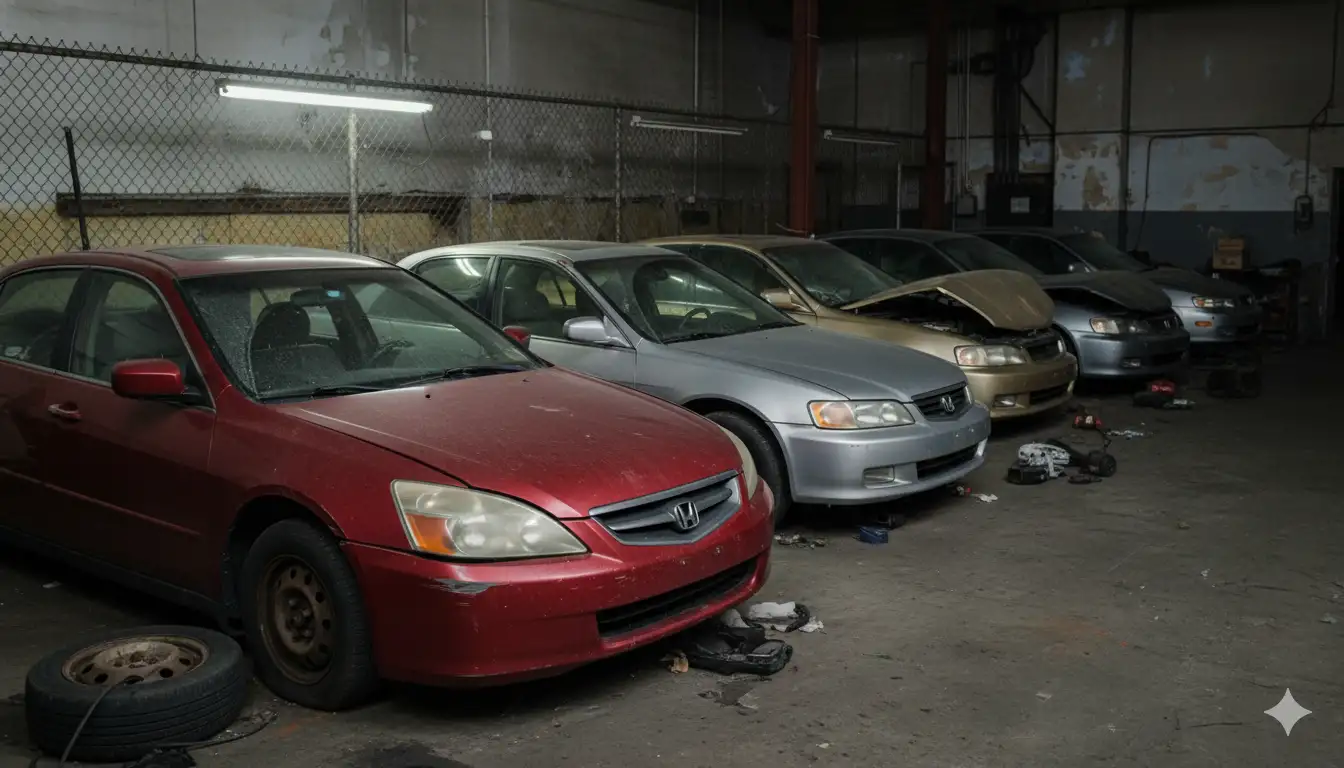
Key Takeaways
- Avoid 2003-2004 at all costs due to transmission failures exceeding car value
- Skip 2008 models requiring constant oil monitoring and additions
- Bypass 2018 Accords with unresolved 1.5T oil dilution issues
- Target 2016-2017 for optimal reliability and modern features
- Consider 2011-2012 for exceptional value under $10,000
- Choose 2021-2022 for latest technology with proven reliability
- Always verify maintenance records regardless of model year
Decision Path / Next Steps
Check service records for transmission work on 2003-2004 models, verify oil consumption tests on 2008-2010 models, and prioritize 2016-2017 or 2021+ models for the best reliability. Always get a pre-purchase inspection focusing on known issues for the specific year you’re considering.
Start your search by filtering out all problematic years from online listings. Focus on one-owner vehicles with complete service records showing regular maintenance. For 2003-2007 models, immediately eliminate any V6 with automatic transmission regardless of condition or price.
Request oil consumption test results for 2008-2011 models or budget for the test yourself. Check if the extended warranty repair was completed. For 2018-2020 models with 1.5T engines, verify if software updates addressing oil dilution were installed.
Schedule pre-purchase inspections with mechanics familiar with Honda-specific issues. Ensure any accident history is thoroughly documented. Budget $150-200 for comprehensive inspections that could save thousands in repairs.
Consider certified pre-owned 2021-2022 models if your budget allows, as remaining warranty coverage provides peace of mind. For budget buyers, focus on 2011-2012 4-cylinder models with manual transmissions for maximum reliability and lowest ownership costs.
Finally, join Honda Accord owner forums to research specific VIN ranges and production dates with higher problem rates. Early production runs often have more issues than mid-year manufacturing.
Frequently Asked Questions
What are the worst years of the Honda Accord to buy?
The worst years are 2003-2004 due to catastrophic transmission failures costing $2,700+, 2008 with excessive oil consumption problems, and 2018 with 1.5T oil dilution issues.
What is the most common problem with Honda Accords?
Transmission failures in 2003-2007 V6 models and excessive oil consumption in 2008-2012 models represent the most widespread and expensive problems affecting Honda Accords.
What years did the Honda Accord have transmission problems?
2003-2007 Accords, especially 2003-2004 models, suffered from widespread automatic transmission failures typically occurring between 90,000-100,000 miles.
Is the 2003 Honda Accord a year to avoid?
Yes, 2003 is the absolute worst Honda Accord year with transmission failures affecting the majority of vehicles and repair costs exceeding the car’s value.
Is the 2008 Honda Accord a year to avoid?
Yes, avoid 2008 due to excessive oil consumption requiring additions every 1,000-3,000 miles and premature rear brake wear issues.
What is the oil dilution problem with the 2018 Honda Accord?
The 1.5T turbo engine allows gasoline to mix with engine oil during cold starts and short trips, causing rising oil levels, gas smell, and potential engine damage.
Which Honda Accord generation is the most reliable?
The 9th generation (2013-2017), particularly 2016-2017 models, offers peak reliability after Honda resolved early CVT issues and before introducing turbo engines.
What are the best years to buy a used Honda Accord?
The best years are 2016-2017 for reliability and features, 2011-2012 for value, 2021-2022 for modern technology, and 2000-2002 for budget buyers.
Did Honda fix the transmission problems after 2004?
Yes, transmission reliability improved significantly by 2005-2007, though V6 models remained somewhat problematic. The issue was fully resolved by the 8th generation (2008-2012).
Did Honda fix the oil consumption problem after 2008?
Oil consumption improved in 2011-2012 models through revised piston rings and VCM updates, with the issue fully resolved in 2013+ models.
Is the 2013 Honda Accord a good year to buy?
The 2013 is decent but had early CVT issues and starter problems. Consider it only with comprehensive service records or choose 2016-2017 for better reliability.
Is the 2017 Honda Accord a reliable car?
Yes, 2017 is one of the most reliable Accord years ever produced, representing the refined end of the excellent 9th generation with modern safety features.
References
- CarComplaints.com. (2025). 2003 Honda Accord Transmission Failure Reports. https://www.carcomplaints.com/Honda/Accord/2003/transmission/transmission_failure.shtml
- Reddit Automotive Forums. (2018). Honda Accord Transmission Issues Discussion. https://www.reddit.com/r/autorepair/comments/83cmnd/2003_honda_accord_180k_miles_transmission_issue/
- Honda Problems. (2015). 1999-2004 Honda Automatic Transmission Failures. https://www.hondaproblems.com/transmission-failure/
- Consumer Reports. (2015). Honda Accord CR-V Warranties Extended for Oil Consumption. https://www.consumerreports.org/cro/news/2015/05/honda-accord-cr-v-warranties-extended-for-excess-oil-consumption/index.htm
- Car Problem Zoo. (2019). 2008 Honda Accord Engine Burning Oil Problems. https://www.carproblemzoo.com/honda/accord/2008/engine-burning-oil-problems.php
- Mike’s Car Info. (2024). Understanding Oil Dilution in Honda’s 1.5L Turbo Engines. https://www.mikescarinfo.com/2024/01/understanding-oil-dilution-in-hondas.html
- Honda Service Bulletins. (2014). Starter Motor Issues 2013-2014 Accord. dealer documentation
- J.D. Power. (2025). Vehicle Dependability Study Results. https://www.jdpower.com/business/press-releases/2025-us-vehicle-dependability-study-vds

I am a senior automotive analyst at Autvex. Expert vehicle evaluations, in-depth reviews, and objective analysis helping readers make informed automotive decisions with years of industry experience.

